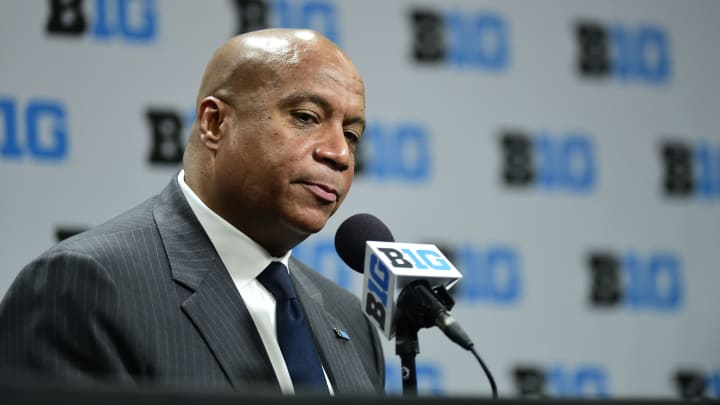COLUMN: Because We Don’t Know, These COVID-19 Cancellations Had To Happen

CHAMPAIGN, Ill. -- I don’t know.
As time continues to progress, we’ve been trained as human beings to be allergic to the combination of this three-word sentence. We want our politicians, officials, famous people and anybody in the public eye for their five-minutes of fame to know everything and when they don’t, we dismiss them, mock them on social media and ruin them.
In an overall sense, this is an incorrect mindset. Saying “I don’t know” is an honest assessment of a situation that could and should be preceded by the act of figuring out how to find the answers. Trying to disseminate incorrect or false information or guesses, whether it is intentionally or not, is the absolute worst thing that can happen for a general public starving for the correct knowledge.
However, in the last 24-48 hours, it is those three words that have dictated the decisions being made by officials representing sporting events all over the world. The world health epidemic related to the concerns over the COVID-19 epidemic made this three-word sentence the answer by many experts in regard to too many immediate questions forcing professional leagues and the NCAA to make the decisions that were needed.
When is this virus going to run its course and become less than the immediate health threat to this public residing in this country and the overall world in general? We don’t know. Nobody does.
Where and when is it safe to start gathering in large crowds again? We don't know. Nobody does.
Where and when is it safe to start playing organized sporting events again? We don’t know. Nobody does.
What could happen if any officials, coaches or players were to test positive for the novel coronavirus? We don’t know. Nobody does.
In the world of college athletics, “I don’t know” was clearly the answer given to the leadership personnel including NCAA president Mark Emmert, conference commissioners, tournament officials, university presidents and school athletics directors. And if they were responsible individuals, and I have no evidence to suggest otherwise, I have to imagine all those important decision-makers immediately “well, if you don’t know then I don’t know either and if I don’t know, I can’t protect the best interests of all these people I’m responsible for”.
This is why Villanova head men’s basketball coach Jay Wright called the NCAA’s call “an intelligent decision” on ESPN Thursday afternoon.
Feel free to argue if you want that all of these VIPs in college athletics have overreacted to this world health epidemic. I, and most folks I consider reasonable minds would disagree with you, but you’re free to have that opinion. This is an unprecedented decision of canceling the 2020 NCAA men’s and women’s basketball tournaments along with the canceling of all winter and spring sports championships. This decision affects thousands of college athletics. It will affect billions of dollars in the economy of college athletics.
Locally here at Illinois, you’re looking at a situation where the Fighting Illini basketball program was going to have its March Madness moment for the first time in seven years. Brad Underwood and sophomore guard Ayo Dosunmu were going to see Illinois get selected Sunday to the tournament it assumed in the 90s and 2000s it would annually be involved with. This was supposed to be part of the final moments of a 2019-20 season where Illini came back into the national relevance on the postseason stage everybody recognizes. Instead, Illinois’ NCAA tournament drought will stretch one more year and Dosunmu will likely leave for professional basketball without having played a single game in March Madness and fulfill the “unfinished business” he talked about repeatedly when he announced his return for his sophomore season. Don’t misunderstand me. This is disappointing. This stinks. But do you know what would be truly, by definition, sad? If Dosunmu were to test positive for the virus. If an older, more vulnerable, person in Dosunmu’s family or Underwood’s family would test positive for COVID-19. That was be truly sad and irresponsible. It would also have been avoidable.
So, please tell me what responsible option did they have? For example, Duke University announced they were suspending all activities on its college campus including men’s college basketball. From a logistics aspect, Duke’s athletics director, Kevin White, is the chairperson of the NCAA Division 1 men’s basketball selection committee. So, how was the NCAA Tournament field going to be selected when blueblood programs had already said “thanks but no thanks” to accepting a bid in the 2020 NCAA tournament? It wasn’t.
In one of his first large public media conferences, Big Ten Conference commissioner Kevin Warren expressed a responsibility that we should applaud in leadership.
“I think the biggest thing is the uncertainty,” Warren said Thursday when his conference canceled its conference tournament. “I’m a big believer in asking a lot of questions, gathering information and making decisions based upon the best information that I have. There were a lot of people who were telling me, ‘I don’t know.’ I get concerned when I hear ‘I don’t know’ a few (too) many times.”
Warren, like a lot of successful leaders, knows “I don’t know” is an acceptable answer because we’re not all experts in all fields. However, it isn’t acceptable when trying to find solutions. Therefore, the only proper solution was to walk away.
